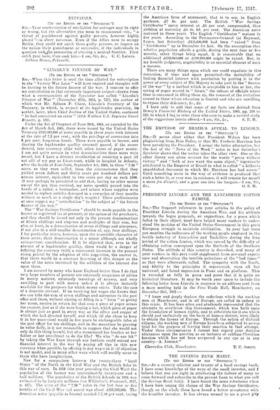PRESIDENT LINCOLN AND THE LANCASHIRE COTTON FAMINE.
[To THE EDITOR OF THE " SPECTATOR."]
SIR,—The frequent references in your articles to the policy of President Lincoln during the American War, and his attitude towards the bogus proposals, or suggestions, for a peace which failed in their object, must have helped many readers to under- stand the position of the United States Government in this great European struggle to maintain civilization. In your last issue you mention the endurance of the working people employed in the textile industry of Lancashire and Yorkshire daring the long period of the cotton famine, which was caused by the difficulty of obtaining cotton consequent upon the blockade of the Southern States. The attitude of this country is described, and many of your readers in this part could supplement from personal experi- ence and observation the terrible privations of the " bad times" as they were afterwards called. The sympathy with the North, and fidelity to the principles it represented, were all but universal, and found expression in Press and on platform. This is recorded so fully in prose and poem that it is quite an historical literature. It may be worth your space to include the following letter from Lincoln in response to an address sent from a mass meeting held in the Free Trade Hall, Manchester, on December 31st, 1862 :- " I know and deeply deplore the sufferings which the working men at Manchester, and in all Europe, are called to- endure in this crisis. It has been often and studiously represented that the attempts to overthrow this Government, which was built upon the foundation of human rights, and to substitute for it one which should rest exclusively on the basis of human slavery, were likely to obtain the favour of Europe. Through the action of disloyal citizens, the working men of Europe have been subjected to severe trial for the purpose of forcing their sanction to that attempt. Under these circumstances I cannot but regard your decisive utterances upon the question as an instance of sublime Christian heroism which has not been surpassed in any age or in any country.—A. LINCOLN."


































 Previous page
Previous page